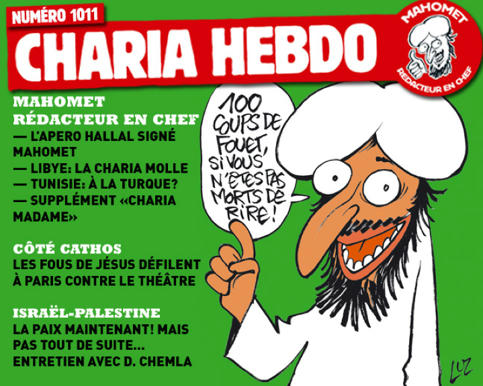Actually, reports indicate that the four hostages were killed before the police stormed the market.
See the Wall Street Journal, "Police Kill Two Suspects in Magazine Massacre; Ally Shot Dead After Four Killed at Kosher Grocery":
PARIS—France’s capital was transformed into a war zone as a three-day manhunt for militants who attacked the magazine Charlie Hebdo ended Friday when security forces in simultaneous raids killed three men suspected in the slaying of 17 people, including four hostages at a kosher grocery.Keep reading.
The carnage played out in a multifront battle that frayed the nerves of a nation already on edge over the state of its security and social cohesion.
By the time the smoke cleared, police had killed Said Kouachi, 34 years old, and his brother Chérif Kouachi, 32—the two gunmen suspected of Wednesday’s attack on the French magazine. Authorities had cornered the French-born brothers at a printing facility near the capital’s main airport.
On the city’s eastern edge, meanwhile, police stormed a kosher grocery where an alleged confederate of the two brothers held several people hostage at gunpoint. The man, Amedy Coulibaly, 32 years old, was killed. Officials said they believed he killed four hostages before police raided the store.
On Thursday, Mr. Coulibaly allegedly shot and killed a female police officer in a southern suburb of Paris. Authorities continued searching Friday for a woman, Hayat Boumediene, in connection with the officer’s killing.
As the violence unfolded Friday, France saw three native sons, hailing from one of Europe’s largest Muslim populations, attacking their countrymen on behalf of terrorist groups a continent away.
Political fallout from the attacks risks deepening the alienation of France’s five million-strong Muslim minority—a social and economic rift that has long made the country a powder keg for unrest.
“France isn’t finished with the threats facing it,” President François Hollande said in an address to the nation. “Unity is our best weapon.”
While under siege Friday, the gunmen conducted phone interviews with French television. Chérif Kouachi said he had trained in Yemen and had received financing by an al Qaeda faction to launch attacks in France. Mr. Coulibaly allegedly told French TV he was acting on behalf of the terror group Islamic State.
The terror crisis began in the early hours of Wednesday morning as two men wearing balaclavas, military fatigues and carrying AK-47 rifles walked into the newsroom of Charlie Hebdo and opened fire. The barrage left 11 people dead, including the publisher and some of France’s most celebrated cartoonists.
Fleeing the scene, the brothers evaded several police cars and killed one officer at point-blank range. In an abandoned getaway car, the brothers left behind Molotov cocktails, a GoPro camera and an important piece of evidence—the national identity card of Said Kouachi.
That clue led investigators to Mr. Kouachi’s brother, Chérif, who had been convicted in 2008 for belonging to a terrorist group. Prosecutors said Chérif Kouachi had also traveled to Yemen in 2011.
The slaughter at Charlie Hebdo sparked anger around the world. The magazine had for years stirred outrage and death threats with its caricatures lampooning Islam, just one of its many targets of satire.
On Thursday, a policewoman directing traffic around a car accident in the southern Parisian suburb of Montrouge was shot and killed. Police homed in on Mr. Coulibaly after recovering a balaclava that contained his DNA.
Mr. Coulibaly later claimed responsibility for the killing, saying he had “synchronized” the move with the Kouachi brothers.


